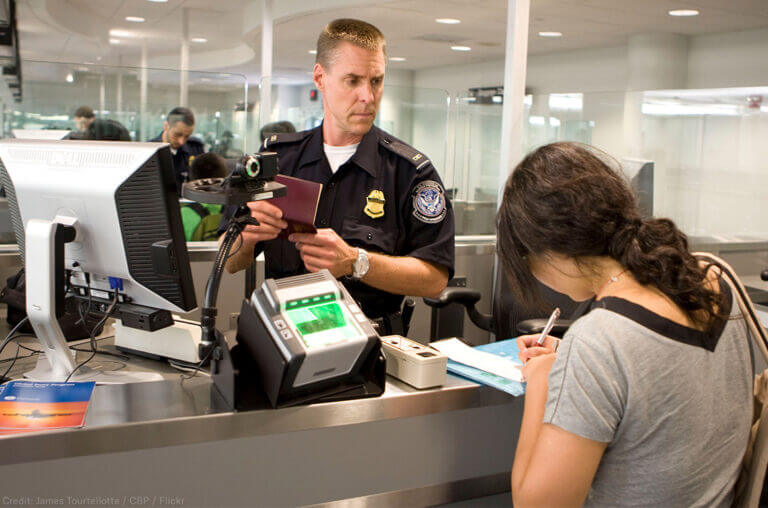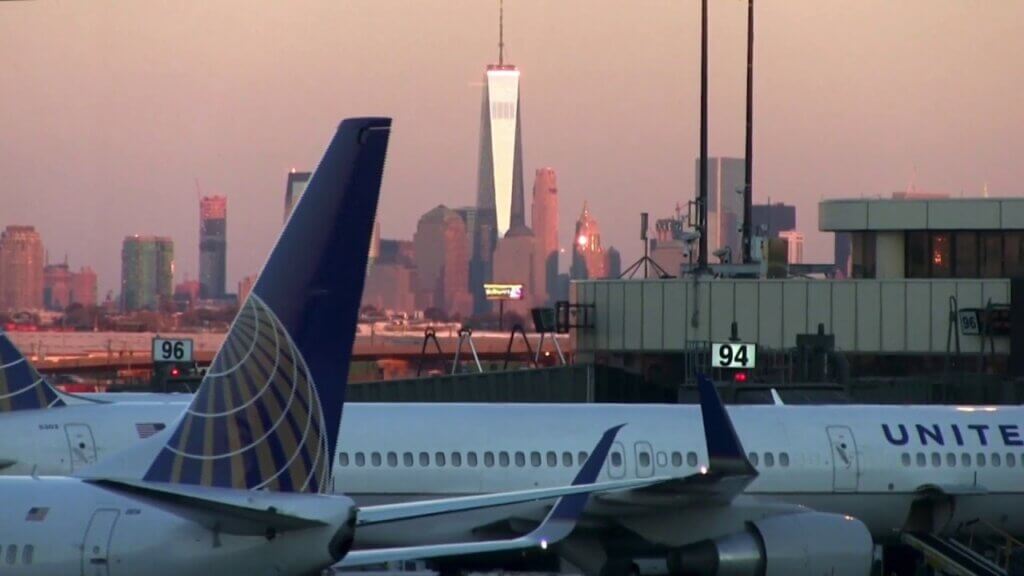Vacation, Departure, & Re-Entry
Whether during or after your academic program here at Monmouth University, we strongly encourage all of our international students to continue to broaden their minds by further traveling both within the United States and abroad. Most travel would likely take place during summer vacation and/or the winter holiday break. However, when classes are in session, shorter trips may also be possible depending on each student’s individual classes/schedule. When traveling domestically across the United States (including Puerto Rico and the U.S. Virgin Islands), an international student will not need to travel with their I-20 document. Instead, a government issued I.D. such as a passport or a U.S. “real” Driver’s License would suffice for domestic travel.
If an International Student is interested in receiving a United States issued driver’s license, they may apply at their local Department of Motor Vehicles (DMV). Although having a Social Security Number (SSN) card is preferred prior to applying at a DMV, it is not required. Documentation that needs to be shown at the DMV when applying for a driver’s license as an F-1 or J-1 visa holder include: the form I-20, valid passport, most recent student visa, and proof of residence. If not already in possession of an SSN card, an additional document will need to be submitted named the “Affidavit of no Social Security Number or Individual Taxpayer ID number,” which can be found below. Additionally, if already on Optional Practical Training (OPT), the F-1 visa holder would also need to include their Employment Authorization Documentation (EAD card).
When traveling internationally to visit home or to vacation in another country, international students will need to prepare documentation for re-entry into the country before their intended travel plans. The actual departure of the United States to a destination abroad will almost never be an issue. Most issues that occur happen at the Port of Entry when passing through Customs and Border Patrol (CBP) due to incorrect or invalid documentation.
It is completely at the discretion of CBP to allow or deny entry to any given individual at the border based on the documentation presented.


Returning to the United States
When returning into the country from abroad, an international student must have with them the following documentation:
- Passport (valid at least six months into the future)
- Valid F-1 Visa (not required for Canadians and Bermudan citizens)
- A printed copy of the most recently issued I-20 with a valid travel endorsement
For students on OPT, in addition to presenting your passport, visa, and I-20, you will also need to show your:
- Employment Authorization Card (EAD)
- Letter of Employment (only if applicable)
Whether a current student or a post-completion student on OPT, in case you experience an emergency at the port of entry, we recommend having the Monmouth University Police Department (MUPD) contact information on hand. You will need to contact MUPD directly and they will route you to a DSO in the Global Education Office.
Monmouth University Police Department: 732-571-4444 (available 24/7)
Travel Endorsement
Having your most recent I-20 may not always be enough for your re-entry into the country. Before travel, a student must always confirm they have a valid travel endorsement. Each travel endorsement for a continuing student is located on page two of an I-20 and is valid for one year at a time. When a I-20 is first created, all students will automatically receive their first signed travel endorsement.
If you have already completed your program and are currently on OPT or engaging in the STEM OPT Extension, your travel endorsement is only valid six months at a time.
Once the first travel endorsement expires, it will be the responsibility of each student to reach out to the Global Education Office to inquire about obtaining an updated endorsement.
Example of an I-20 Travel Endorsement

Travel FAQ’s
What can I expect passing through the port of entry?
When passing through any port of entry into the U.S., you will speak with and be required to show all of your documents to a Customs and Border Patrol (CBP) officer. Only they will be able to grant you an official status for admission into the country as an F-1 student. You will likely be asked a few questions by the CBP officer, such as what your purpose will be in the U.S. As a student you must be prepared to answer truthfully and to always indicate you are here for academic purposes and have every intention of returning home after the completion of your program. Once the CBP office is satisfied, you will be admitted into the country, your electronic I-94 record will be updated, and you will receive a stamp in your passport to note your admission details. These details should include the date of entry, Immigration status in which you were admitted, and the expiration date of status (D/S for F-1 students). If you experience an emergency at the port of entry, you can contact MUPD directly and they will route you directly to a DSO in the Global Education Office for assistance.
What is secondary inspection?
When a student is entering through a port of entry, CBP is looking to quickly and efficiently review traveler documentation for entry. Occasionally, they may have more detailed questions or require additional information from a student. In this case, the student may be pulled aside and placed in secondary inspection for further vetting. This can be an intimidating and potentially traumatizing experience, so to avoid this, students should make sure they always have their proper and most up-to-date documentation when traveling.
What is this I515A document I received at the port of entry?
This document is given by CBP when they are not satisfied with the documentation you provided at the border. It is a temporary pass that allows you into the country for 30 days allotting you some time to gather any additional information or documentation they require. If you do receive this form, you will need to inform our office and send a copy for us to review immediately. We can then work together on collecting the necessary documentation for submission to SEVP.
As of, June 26, 2024, students who receive a Form I-515A, “Notice to Student or Exchange Visitor,” from a U.S. Customs and Border Protection officer will be instructed to email their required documentation to the Student and Exchange Visitor Program (SEVP) Form I-515A Processing Team at SEVIS.I-515@ice.dhs.gov instead of mailing the documents to SEVP.
My visa expired but my I-20 is valid. Do I need to leave the country? Will I be able to re-enter?
No, an I-20 and a visa cannot work interchangeably since they function differently. The F-1 visa can be viewed as a key that grants you access into the country to study here as a student. Once you are inside the country your I-20 and immigration record are what keeps you here in status. That being said, if your visa expires while you are within the country you will not need to leave the country as you are still in F-1 visa status working towards your degree. However, should you need to or decide to leave the country with an expired visa, you will need to work to get it renewed at a foreign consulate or embassy abroad before re-entering.
My passport is expiring. How can I renew it?
To renew a foreign passport once it has expired, a student must contact and schedule an appointment with their local embassy or consulate in either NYC, Philadelphia, or Washington, D.C. Unfortunately, the Global Education Office does not have any influence on foreign countries’ passport renewal process and will not be able to assist directly. However, should any specific documentation by the embassy or consulate be needed for the renewal of your passport, please contact us directly for guidance.
I am currently in the U.S. but my passport and visa were stolen/lost. I also have plans to travel outside the country soon. What do I need to do?
Unfortunately, in this instance, travel abroad will not be possible until your passport is renewed. To renew a foreign passport once it has been stolen or is lost, a student must contact and schedule an appointment with their local embassy or consulate in either NYC, Philadelphia, or Washington, D.C. Although you may remain in the country after you’ve renewed passport, once you leave the U.S. you will not be able to re-enter in F-1 status until the F-1 visa is also renewed. To do this, you will need to contact a foreign embassy or consulate abroad to schedule a visa renewal appointment.
I accidentally entered the country as a tourist. Is that okay?
No. A tourist visa is only meant for tourism in the U.S. and not for study. Entering as a tourist instead of entering as an F-1 student would incorrectly close out your F-1 student immigration record and will lead to ramifications both short and long term. This error will need to be fixed immediately by working with the Deferred Inspection Office at the airport of which you arrived in the country. For more details or guidance, please reach out to our office directly at geointernational@monmouth.edu.
I will be studying abroad for a semester with Monmouth and will be outside the country for a long period of time. Is this an issue?
Normally, if a student is outside the country for five months or more as an F-1 student, the immigration record could be closed out by SEVP or issues could arise when trying to re-enter the country. However, if you will be studying abroad for a semester with Monmouth, remarks by your PDSO/DSO can be placed in your immigration record and on an updated I-20, allowing you to be outside the U.S. for an extended period of time.
